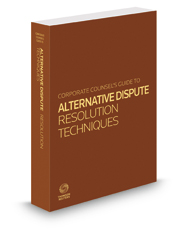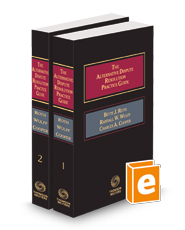
As mentioned prior, "alternative dispute relations" is defined as any procedure for settling a dispute other than litigation. The main advantages being rapidity, confidentiality, and flexibility.
All ADR methods have common characteristics – i.e., enabling the parties to find admissible solutions to their conflicts outside of traditional legal/court proceedings, but they are governed by different rules.
Alternative Dispute Resolution typically includes early neutral evaluation, negotiation, conciliation, mediation, and arbitration. As burgeoning court queues, rising costs of litigation, and time delays continue to plague litigants, more states have begun experimenting with ADR programs. Some of these programs are voluntary; others are mandatory.
 Mastering Alternative Dispute Resolution
by
Mastering Alternative Dispute Resolution
by
 Alternative Dispute Resolution
by
Alternative Dispute Resolution
by
 Corporate Counsel's Guide to Alternative Dispute Resolution Techniques
by
Corporate Counsel's Guide to Alternative Dispute Resolution Techniques
by
 Creative Problem Solver's Handbook for Negotiators and Mediators
by
Creative Problem Solver's Handbook for Negotiators and Mediators
by
 How ADR Works
by
How ADR Works
by
 Alternative Dispute Resolution Practice Guide
by
Alternative Dispute Resolution Practice Guide
by